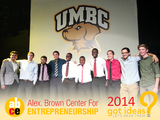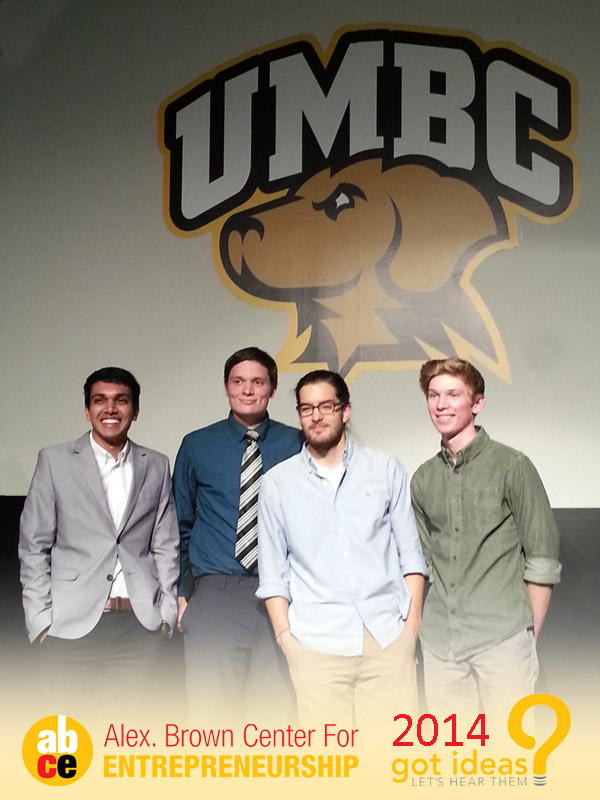2014 Idea Competition Recap & Winner Announcement
Great ideas & for the first time ever: A TIE FOR 1st PLACE!
The night began with a deep breath from David Verghese, the 2014 Idea Competition’s first presenter, as he stepped up on stage. eID was tackling the issue of having to juggle two campus id cards; one you use to pay for everything, the other to get you in your dorm. His cracked Red Card shows its use, and “how antiquated our current system is.”
Sai Kumar Popuri, a graduate student, has created a community driven mobile application that aims to solve some of the parking issues on campus. SPOK – Spot n Park depends on people to tag a spot as free as they are leaving. As users walk through the lots, they can give an overview if they are full or not.
Patrick Wheltle came on stage with an arsenal of medics to explain his Electronic Triage Tagging system. The current paper tagging method hasn’t changed in 40 years. His idea would help to identify injured people during a terrorist attack or natural disaster when there is a high need; when there are a high need to get people found, identified, and to the hospital as quickly and efficiently as possible. The electronic tags are reusable, and transmit a minimal amount of information about the patient (Gender, Est. Age, Treatment Level…nothing identifiable) about 30 feet. Each tag would operate on a mesh network, strengthening each tag's power and distance based on the number used.
Three guys in red ties, Edgar Nzokwe, Sory Kante, & Christopher Pagan, stepped up to the stage next. Their Android app, Flashbot, aims to help you to create, organize, and store your flashcards in the cloud. The application is easy to access, provides text to voice capabilities, and allows you to share or even sell your flashcards to members of the community. They are expecting to have the app ready for launch by the beginning of spring semester.
I don’t think anyone would argue that of all of our contestants, Noah Hutton, sprung on to stage with an energy and passion that was infectious. In contrast to the others, his idea, The Power of School Supplies, was very much a social project more than a business venture. As a student teacher at Digital Harbor High in Baltimore he identified that not every student has the supplies they need to excel. He is working on (and we’re going to help him) a collection drive for our, or other k-12 schools, unused or lightly used school materials. At the end of the semester, you have spiral books that you haven’t completely filled, binders that you may not need anymore, pencils and pens that you will just loose by spring semester, or a book bag that you’re just tired of. Instead of throwing all of this away, like many of us do, Noah wants to collect it, organize it, and donate it to schools in the city that may need it. A spiral notebook with 20 pages in it is better than not having one.
Indi– Exploration and Exercise, a mobile app created by Nitin Sampathi looks to combine your interests with exercise. You tell the system some things you love doing. It searches your area for that Pizza shop and
bookstore you want to find and spits out a map for you to do a 1, 3, 5…mile walk or bike ride with two stops along the way. If you don’t have a bike, no problem. The app finds bikesharing locations close by and tells you where to drop it off, if it’s a one way trip.
bookstore you want to find and spits out a map for you to do a 1, 3, 5…mile walk or bike ride with two stops along the way. If you don’t have a bike, no problem. The app finds bikesharing locations close by and tells you where to drop it off, if it’s a one way trip.
Having fought being sick all week, Eric Mundschenk came up on stage with vigor. When you came to college did you know what you wanted to major in? Do you have a clue what you want to be when you grow up? DegreeIQ aims to give you that path. Working backwards, it will help you evaluate and choose a career path. It will then provide you with recommended classes, notifications of networking opportunities surrounding your chosen field, as well as reminders of important dates (i.e. registration for graduation happens at the beginning of the semester you’re scheduled to graduate. It’s sneaky. Don’t say I didn't warn you.) Users are also given a ‘Career Buddy,’ which pairs you with a mentor in your field for you to intern with, learn from, and go to for personal advice.
Dan Armstrong and Matthew Berry are trying to solve some of the communication issues with college groups and want students to feel more of a connection with the campus. A mobile application that would put all of your social networks on one platform and allow group texting to members of your group.
Armed with a head of lettuce and two flats of salad greens, Andres Camacho confidently explained his idea about installing hoop houses, a type of greenhouse, on campus or nearby. True Greens would be a student focused group that looks to bring in different student groups and majors (in a very Interdisciplinary Studies, Camacho’s major, method). Engineering students could help to build the houses. Environmental Scientist can help with soil testing. He wants True Greens to be able to supply True Grits with nutritious vegetables that we can slather in ranch dressing. The microgreens could also be sold in a farmer’s market fashion, or a CSA model, to students and faculty/staff.
Nearly 200 students turned out to the event and cast their votes. I can tell you, each vote really can make a difference!
For the first time in Idea Competition history, we had a tie for first place. It was down to the last vote. But, here were the results.
Best Idea:
Patrick Wheltle – Electronic Triage Tags &
Andres Camacho – True Greens
Best Presentation:
Patrick Wheltle – Electronic Triage Tags
3rd Place:
Nitin Sampathi - Indi– Exploration and Exercise
A special thanks to our participants, alum judges, and to all the students who came out to listen and help select the winners! Congrats!
Tags:
Posted: November 13, 2014, 11:04 AM

